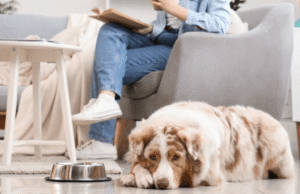
If you’re a Boise dog owner and you’re worrying that your pet may suffer from separation anxiety, this guide to Boise dog separation anxiety training will help you understand the issue and take real steps toward a calmer home. Learn how the team at All Dogs Unleashed Boise can support your dog’s behavior transformation.
What Is Dog Separation Anxiety in Boise?
When your dog becomes overly glued to you and panics when you leave, that’s more than a bit of sadness—it may be true anxiety. Even well‑behaved dogs can struggle when left alone. Recognizing this matter early means you can act before things get worse.
Signs of Dog Separation Anxiety in Boise
Here are common signs to look for:
-
Non‑stop barking, howling or whining when left alone, beyond what might be considered normal
-
Destructive behaviors: chewing doors or window sills, digging by exits, trying to escape
-
Pacing, walking in fixed patterns when alone
-
House‑soiling, even if previously house‑trained
-
Excessive salivation, panting or drooling when separated
-
Extreme greetings when you return, far beyond normal excitement
Why does it happen?
There isn’t always a single cause. Some contributing factors include:
-
Ageing dogs may develop anxiety
-
A change in routine or loss of a family member
-
Rescue dogs: past trauma or neglect often raises risk
-
Physical illness: Always check with a vet to rule out medical causes
For a detailed breakdown of causes and behavior patterns, see this helpful AKC guide on dog separation anxiety.
How Dog Anxiety Training in Boise Helps
Training tailored for separation anxiety can significantly reduce stress for your dog. Effective strategies include:
-
Building confidence: using positive reinforcement so your dog links alone time with good things
-
Establishing routine: creating a predictable pattern before departures helps your dog feel safer
-
Teaching relaxation: e.g., get your dog to settle on a mat or bed on cue, so they learn a calm behavior when alone
-
Crate training (when appropriate): a well‑introduced crate can become a safe “den” rather than a punishment
-
Gradual desensitization: leaving your dog alone for short periods and slowly increasing time so they adjust
-
Command training: basics like “sit”, “stay”, “come” redirect focus and give structure
-
Counter‑conditioning: pairing your departure with something positive (a treat toy) so your dog expects something good when you leave
Training options we recommend for Boise area dogs
-
In‑home lessons: A trainer comes to your Boise home, assesses your dog and works with you directly.
-
Board‑&‑train: For more serious cases, your dog stays with the trainer for a period to reset behavior in a focused environment. (Ensure the trainer explains how to transition the training back home.)
Using the right option can make the difference between continued anxiety and a relaxed, happy dog.
Next steps for Boise dog owners
-
Observe your dog’s behavior the next time you leave home. Note any patterns of anxiety.
-
Consult your vet to rule out health issues.
-
Choose a qualified trainer with experience in separation anxiety. Ask about success stories and clear plans.
-
Commit to the training plan fully — routine, consistency, and gradual progress matter most.
-
Celebrate improvements (however small)! Every calmer moment is progress.
Ready to see real results? Board & Train and get your dog on the path to success.
Need help getting started? Contact Us today and speak with a Boise-area dog training expert.
FAQ
Q: Can separation anxiety be completely cured in dogs?
A: While some dogs may fully overcome it, most dogs learn to manage their anxiety through consistent training, routine, and support. The goal is to reduce stress and improve behavior.
Q: What breeds are more prone to separation anxiety?
A: While any dog can develop it, breeds like Labrador Retrievers, Border Collies, German Shepherds, and rescue dogs tend to be more prone due to their sensitivity and attachment levels.
Q: Is it okay to use calming supplements or CBD for dog anxiety?
A: Some supplements may help when used alongside training, but always consult your vet first. Supplements alone are not a substitute for behavior training.
Q: Should I ignore my dog when I get home to reduce excitement?
A: Briefly ignoring over-excited greetings can help teach your dog that calm behavior gets your attention. Wait until your dog settles before offering affection.
Q: Can a dog develop separation anxiety later in life?
A: Yes. Changes in routine, environment, family structure, or health can trigger anxiety even in previously calm dogs.


